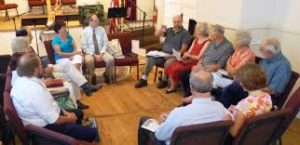 WHY IS THIS IMPORTANT? One of the interesting parts of serving on a state convention staff is the opportunity to visit many churches during the year. Seeing what others provides new ideas, sharpens evaluation skills, encourages critical thinking development, and reminds what it is like to be a guest. Visiting a Sunday School class other than your own can be a great way to improve.
WHY IS THIS IMPORTANT? One of the interesting parts of serving on a state convention staff is the opportunity to visit many churches during the year. Seeing what others provides new ideas, sharpens evaluation skills, encourages critical thinking development, and reminds what it is like to be a guest. Visiting a Sunday School class other than your own can be a great way to improve.
Everyone can benefit from a fresh perspective. Visiting a different class can help leaders break out of their routine and be encouraged to try something new.
WHAT DO I DO?
- Pick a date…Try to visit a class during a “normal” Sunday (not a holiday weekend or special emphasis day). The idea is to see what happens in the group during a typical gathering.
- Have a plan…Create a checklist of what you want to pay attention to, such as how the class begins, how they handle praying together, how members participate in the lesson time, and other items of interest to you.
- Note the time…Keep a log of how time is spent in class: what time did they actually begin? How much time is spent on the teaching time? How much time spent for prayer or other activities?
- Reflect…Take some time to think back through your experience. What were some positive takeaways? What were some noticeable critiques? What can you learn about your own class?
- Resolve to try one new approach in your own class the next week!
_______________
Daniel Edmonds is the Sunday School missionary for the Alabama State Board of Missions
 One of the key Bible texts that has been used to describe the ministry of Sunday School is Matthew 9:35.
One of the key Bible texts that has been used to describe the ministry of Sunday School is Matthew 9:35. A commitment to lifelong learning helps good leaders maintain effectiveness over a long period of time. A training conference will broaden your perspective beyond your own church and community. Attending a conference will connect you personally with others who share your call to leading Sunday School in your age group. Training conferences provide you with a forum to ask questions, receive advice, discover resources, share ideas, and enhance skills…all in a conversational, relational environment that can’t be duplicated through any other medium.
A commitment to lifelong learning helps good leaders maintain effectiveness over a long period of time. A training conference will broaden your perspective beyond your own church and community. Attending a conference will connect you personally with others who share your call to leading Sunday School in your age group. Training conferences provide you with a forum to ask questions, receive advice, discover resources, share ideas, and enhance skills…all in a conversational, relational environment that can’t be duplicated through any other medium.

